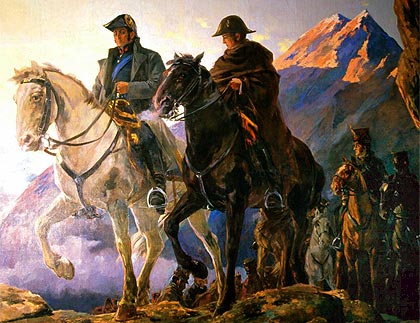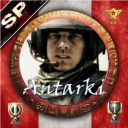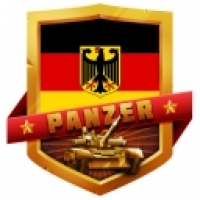![]() Published in Argentina - Social interactions and entertainment - 18 Jan 2017 06:44 - 9
Published in Argentina - Social interactions and entertainment - 18 Jan 2017 06:44 - 9
Buenas estimados,
Hello playfellows,
Vi que cada tanto se publican algunos artículos que poco tienen que ver con el jugo, pero no por ello dejan de ser interesantes. Así que copio y pego una nota sobre algo que espero les guste recordar.
I saw that some articles are published every so often that have little to do with the game, but nevertheless they are interesting. So i decided to copy and paste a note about something that i hope you like to remember or meet for the first time.

El 17 de enero de 1817, en El Plumerillo, Argentina; parte la histórica columna de soldados compuestos por 5.200 hombres al mando del General José de San Martín, para cruzar la cordillera de los Andes y liberar en primera instancia Chile en una de las campañas militares más ambiciosas de la historia moderna.
The 17 of January of 1817, in the Plumerillo, Argentina; begins the journey the historic column of soldiers made up of 5,200 men under the command of General Jose de San Martín, to cross the Andes and liberate Chile in the first instance in one of the most ambitious military campaigns in modern history.
La expedición se convertirá en uno de los grandes hitos de la historia militar a nivel mundial, ya que un grupo de hombres diminuto se adentraba en la cordillera de los Andes, la arteria natural principal de Sudamérica, en una expedición muy arriesgada y sin garantías de triunfo final. El proyecto sanmartiniano encuentra similitudes con el “Plan Maitland” del general escocés Thomas Maitland en el año 1800. En el mismo el general escoces manifestaba que intentar debilitar a España por su corazón (Perú) era simplemente algo en vano, por lo que lo recomendable seria cruzar los Andes por el paso más corto y acceder a Chile para desde allí acceder por mar al bastión realista en Sudamérica. San Martín retomó este proyecto y conocedor de la geografía de Cuyo aplicó el plan de la misma manera aunque con la siempre latente desconfianza de los baquianos puesto que estos solían confundir a los viajeros y comerciantes.
The expedition will become one of the great milestones of military history at a world level, as a small group of men entered the Andes mountain range, the main natural artery of South America, in a very risky expedition and without guarantees of final triumph. The San Martin project finds similarities to the "Maitland Plan" of the scottish general Thomas Maitland in 1800. In the same the scottish general manifested that trying to weaken Spain by his heart (Peru) was simply something in vain, so it would be advisable to cross the Andes by the shortest step and access to Chile from there to access by sea to the bastion Realistic in South America. San Martin resumed this project and how he knew the geography of Cuyo applied the plan in the same way but with the latent distrust of the baquians since they used to confuse travelers and merchants.

San Martín y O'Higgins
Para la enorme campaña se emplearon más de 1.600 caballos, 10.000 mulas y 25 cañones, en una empresa extraordinaria para la época y más teniendo en cuenta que fue en suelo sudamericano. San Martín será acompañado por el luego libertador chileno Bernardo O’ Higgins, y algunos de sus hombres más leales como Miguel Soler y Gregorio de las Heras. Durante el cruce de varias semanas, el alimento principal fue carne seca machacada con rodajas de cebolla cruda. Las bebidas principales fuera del agua eran el vino y el aguardiente para pasar las frías noches en las laderas de los Andes. Tanto los soldados como los animales tenían mantas para las noches muy frías. El cruce finalizara el 8 de febrero con un rotundo éxito y el 12 de ese mes, los patriotas vencerán a los españoles en la decisiva batalla de Chacabuco.
For the huge campaign, more than 1,600 horses, 10,000 mules and 25 cannons were used in an extraordinary undertaking for the time and more considering that it was on South American soil. San Martin will be accompanied by the later Chilean liberator Bernardo O'Higgins, and some of his most loyal men like Miguel Soler and Gregorio de las Heras. During the crossing of several weeks, the main food was crushed dried meat with slices of raw onion. The main drinks out of the water were the wine and the schnapps to spend the cold nights on the slopes of the Andes. Both soldiers and animals had blankets for very cold nights. The crossing will end on February 8 with a resounding success and on the 12th of that month, the patriots will defeat the Spanish in the decisive battle of Chacabuco.
Hasta la próxima!
Kind regard

Support
Rey HeladoEl viejovoozComments (9)

votado 

Buen artículo 

◘ 200 years of the crossing of the Andes ◘ https://www.erevollution.com/en/article/21731 ◘

thx for English

Muy bueno

Maestro Sorro, está bien acordarse de parte importante de la historia argentina.

votado, que bueno aprender algo de la historia grande de suramerica

Me recuerda a Anibal cruzando los Alpes.

Good reading


